As acupuncture for dogs becomes more widely available, devoted dog parents may be wondering if it could be beneficial for their senior dogs. To answer that question (and others), integrative veterinarian Dr. Julie Buzby invites canine rehabilitation specialist Dr. Angela Youello to the blog. Dr. Youello became certified in veterinary acupuncture in 2016 through the Chi Institute of Traditional Chinese Veterinary Medicine. She is a huge proponent of acupuncture for her patients, and thus, the perfect person to write this article.
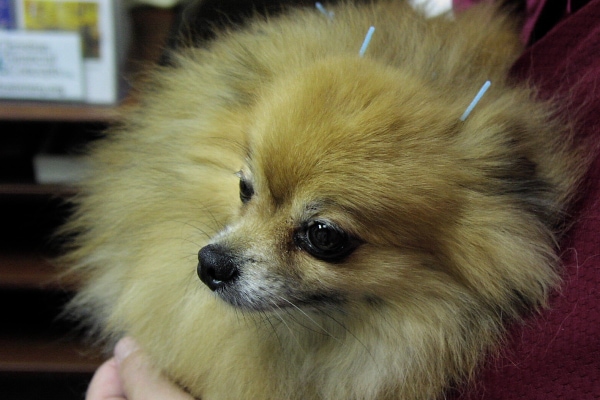
I became interested in acupuncture while I was still in veterinary school because my senior dog, Casey, had hip dysplasia and arthritis. Unfortunately, he also had kidney disease. That limited our options for medications we could use to manage his discomfort. He loved to go for walks around the city with me. But as he got older, he would get tired sooner and his walks got shorter, which made both of us sad.
Casey’s amazing acupuncture treatments
He did well on gabapentin for dogs, but I felt that he needed additional pain relief. So I looked for acupuncture practitioners in my area. At the time, it was less widely available than it is today. However, I was able to find a veterinarian in a nearby town who offered acupuncture, so I started taking Casey to him. The only thing I really noticed during Casey’s first couple of treatments was that he seemed very relaxed while he was resting with his needles in place. He even fell asleep during his second treatment! That was surprising for a dog who was usually anxious during veterinary visits.
Casey started to seem a bit more energetic after his second or third treatment. And then I began noticing that he had a little more pep in his step on our walks. He wanted to walk farther, and was less tired after exercise. Casey even began needing less help going up the steep flight of stairs to our apartment. I ended up taking him for acupuncture regularly throughout the last couple years of his life. It had such a noticeable benefit on his energy level, mobility, and quality of life that I knew I wanted to offer it for my own patients.

What is acupuncture for dogs?
Acupuncture is the practice of inserting small needles into specific points on the body to stimulate a healing response. Acupuncture points occur along specific lines in the body known as meridians. These meridians have been found to correlate with the location of nerve endings and sensory receptors in the nervous system and sometimes blood vessels in the skin and muscle.
Does acupuncture for dogs work?
Western medicine (i.e. conventional medicine) and Traditional Chinese Medicine explain the effects of acupuncture in different ways, but both agree that it definitely works!
From a Western medicine perspective, functional MRI studies in humans have demonstrated that acupuncture affects activity in areas of the brain associated with pain perception, emotion and sensation. Numerous studies in both humans and animals have also shown that acupuncture works to improve blood circulation and reduce inflammation and muscle spasms.
In dogs, acupuncture can increase circulating endorphin levels in post-operative patients following a spay surgery. One study indicated the level of pain relief was similar to that provided by opioid pain medication. This is significant because opioids are considered a gold standard of pain management following surgery.
In Traditional Chinese Medicine, where acupuncture has been practiced for thousands of years, the goal of acupuncture is to allow energy to flow normally through the body, enabling it to heal itself. This energy is known as Qi (“chi”). It flows along meridians, the lines in the body where acupuncture points are located. Placing needles along these meridians is thought to improve the normal flow of Qi.
From both a Western and Traditional Chinese Veterinary Medicine perspective, acupuncture has local effects on the area of the body immediately surrounding the acupuncture point. Plus, it has systemic effects on the whole patient. Often, acupuncture practitioners will use a combination of acupuncture points around the area of the body we are treating and acupuncture points in distant locations on the body. These distant points are designed to create systemic effects such as endorphin release and relaxation.
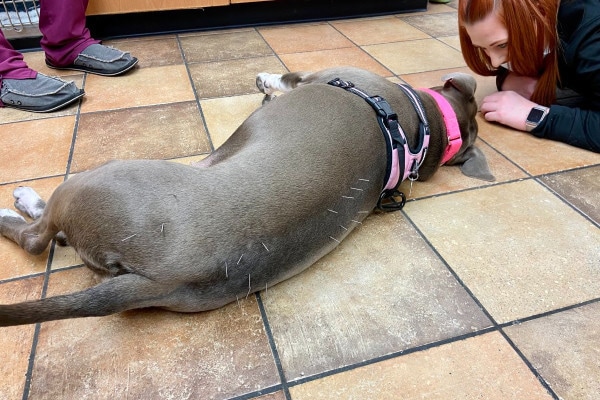
Are there different acupuncture methods?
In addition to placing the acupuncture needles (sometimes referred to as “dry needling”), the acupuncturist can also stimulate acupuncture points by injecting small amounts of liquid. This is known as aqua acupuncture for dogs or aquapuncture. The practitioner will commonly use Vitamin B12 for aqua acupuncture, but he or she could even use saline solution. Injecting the liquid allows for longer duration stimulation of the acupuncture point as the body slowly absorbs the liquid.
Aquapuncture can be a good alternative for very energetic dogs who have trouble staying still long enough for acupuncture needles to be effective. Also, it can be a way to provide more stimulation for a patient. To accomplish that goal, the practitioner may perform aqua acupuncture at the end of the visit after removing the needles.
Electro acupuncture for dogs is another form of acupuncture that can provide more stimulation than simple needle placement. It also has stronger pain relieving effects. For this method, the veterinarian connects electrodes to acupuncture needles and uses them to apply a small current along the meridian.
The practitioner can adjust the amount of current to the patient’s comfort level. Most dogs tolerate this quite well. However, dogs who are inclined to move around during their treatment are usually not good candidates for electro acupuncture. Their movements tend to cause the electrodes to pull out the acupuncture needles prematurely.
What are the uses of acupuncture for dogs?
As you can imagine, acupuncture has applications for managing a wide range of conditions. Some of the more common include:
- Joint pain
- Degenerative joint disease (i.e. osteoarthritis in dogs)
- Hip dysplasia in dogs
- Intervertebral disc disease (IVDD in dogs) and other back problems
- Degenerative myelopathy in dogs
- Kidney disease
- Anxiety
- Decreased appetite and nausea
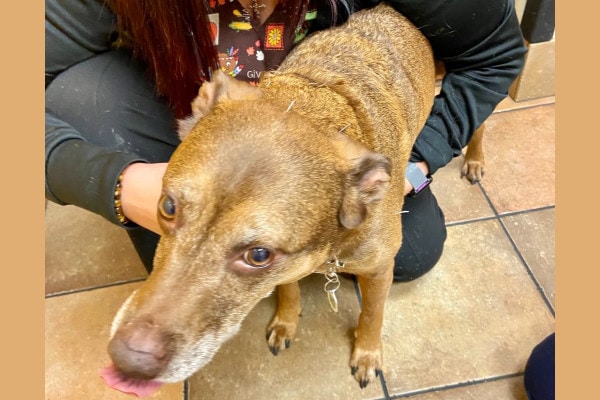
Acupuncture for senior dogs
The most common use for acupuncture, especially in senior dogs, is treating pain and inflammation associated with osteoarthritis in dogs. Acupuncture has a couple of big advantages compared with pain and/or anti-inflammatory medications when it comes to relieving arthritis pain in dogs
First off, acupuncture does not have side effects on organs such as the liver and kidneys. This is in contrast to many pain medications where long-term use requires periodic blood work to monitor kidney and liver values. For this reason, acupuncture is a particularly helpful alternative therapy in older dogs, or those with pre-existing health conditions that limit which medications would be safe.
Secondly, acupuncture also does not have any adverse interactions with pain or anti-inflammatory medications. This makes it a great tool for dogs and cats who need more pain relief than we can provide with medication alone.
Many dogs with joint pain will experience significant increases in comfort and quality of life with regular acupuncture treatments. So if your senior dog is struggling with reduced mobility, much like my sweet Casey was, acupuncture might be just the ticket.
Acupuncture for dogs with IVDD
Additionally, acupuncture can sometimes help dogs with IVDD recover without surgery. This isn’t to say that acupuncture should replace surgery in an acutely paralyzed dog. But it does show a lot of promise in managing pain and improving mobility in some cases.
Acupuncture for dogs with systemic diseases
For many conditions, such as cancer or kidney disease, acupuncture won’t be the first line of treatment. But it can be a helpful tool in a veterinarian’s box of options that he or she can integrate with a traditional medical approach. Acupuncture can also help reduce side effects of some traditional medications. Perhaps its most notable use in this area is reducing chemotherapy-related nausea and decreased appetite.
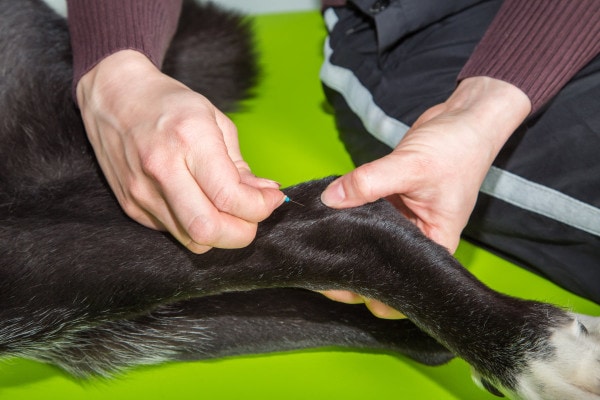
How do I find acupuncture for dogs near me?
Acupuncture has so many wonderful benefits. So it is no wonder that it is becoming more widely used for companion animals and more veterinarians are recommending it for their patients. The best resource for finding an acupuncturist is your regular veterinarian! They may have a local practitioner they refer to and can recommend to you.
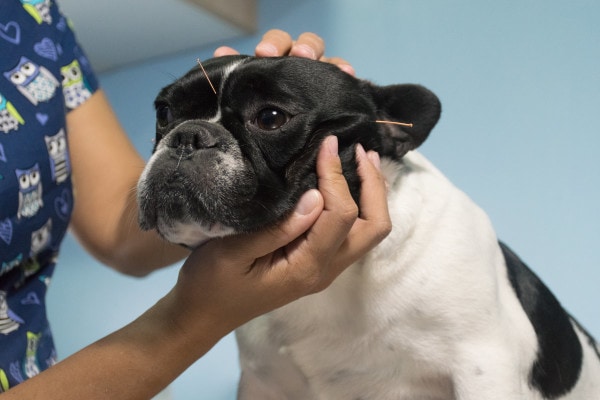
If your vet doesn’t know of any acupuncturists, there are several organizations that maintain a database of veterinarians who practice acupuncture. These include:
- The Chi Institute of Traditional Chinese Veterinary Medicine—Practitioner Database
- The International Veterinary Acupuncture Society—Vet Search
- Curacore—Find A Practitioner Database
- Canine Rehabilitation Institute—Find a Therapist
Who can perform acupuncture for dogs?
Veterinary acupuncturists must go through extensive post-doctoral training in acupuncture. They can become certified by one of several programs that offer acupuncture training and education. Two of those programs are the Chi Institute and Curacore, as mentioned in the practitioner database section.
Some certified veterinary acupuncturists practice in the context of a full service general practice where pet owners might take their dogs for routine medical needs. Others practice in specialty hospitals. This allows them to support post-op surgical patients and other patients with more intensive medical needs. And some practice in clinics dedicated to acupuncture, or that offer acupuncture and physical rehabilitation services together.
Does acupuncture have any risks or side effects?
Acupuncture is generally very safe, with few side effects and low risk. Because the practitioner inserts the acupuncture needles through the skin, there’s a small chance of developing an infection at the site of needle insertion. However, acupuncture needles are much smaller than the needles a vet would use to administer vaccines or injectable medications. Plus, they are sterilized prior to use, so the likelihood of infection is low.
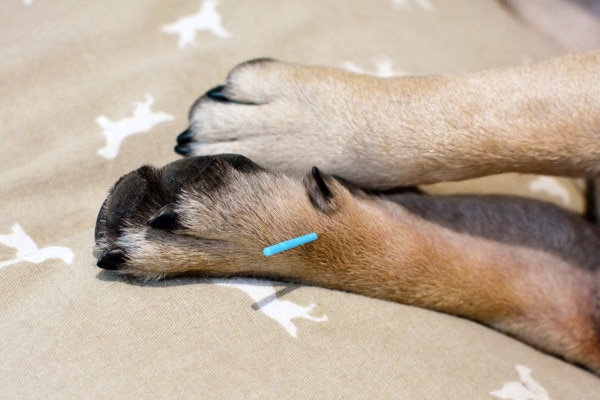
Another possible risk of acupuncture is that the pain relief it provides may mask symptoms of other problems. For this reason, it’s important to use a licensed veterinarian for your dog’s acupuncture therapy. The vet can assess your dog at each acupuncture visit and recommend additional testing or treatment if necessary.
Is acupuncture painful for dogs?
While acupuncture does involve needles, the good news is that it usually doesn’t hurt. The needles used for acupuncture are very small, much narrower than the needles used for vaccinations. Most dogs tolerate them very well. Some dogs will react momentarily to needle insertion, and then settle down once again. Many dogs find acupuncture relaxing. Some dogs become so relaxed they even fall asleep during their treatment!
If an acupuncture point is particularly tender, sometimes the vet will place needles around the point instead of directly into it. Alternatively, he or she can use acupressure. This is a way to provide a lower level of stimulation that stays within the patient’s comfort level.
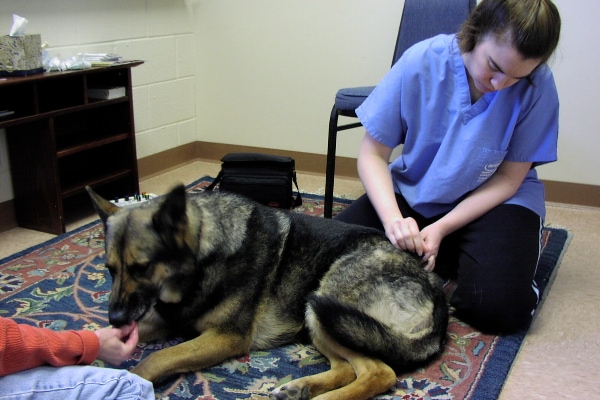
How often will a dog need acupuncture?
There’s a lot of individual variation with frequency of acupuncture. Some dogs respond much more quickly than others. One rule of thumb is that the longer a condition has been present, the longer it will likely take to respond to acupuncture treatment. For example, a dog with acute neck pain may respond much more quickly than a dog with chronic arthritis.
Another general principal is that many patients seem to respond best to more frequent treatments in the beginning. Then the practitioner can taper off the frequency of the visits as the dog improves. Many acupuncturists will recommend weekly treatments initially. Then once the dog starts to improve, the vet will begin tapering until he or she finds the longest treatment interval that maintains the improvement.
Dogs with acute conditions may come in weekly for a few weeks, then every other week for a few treatments. After that, they may be able to remain comfortable without further treatment. Dogs with chronic conditions, on the other hand, often do best with a routine of monthly acupuncture sessions on a long term basis. Your acupuncturist will work with you to figure out the best schedule for your dog’s treatments.
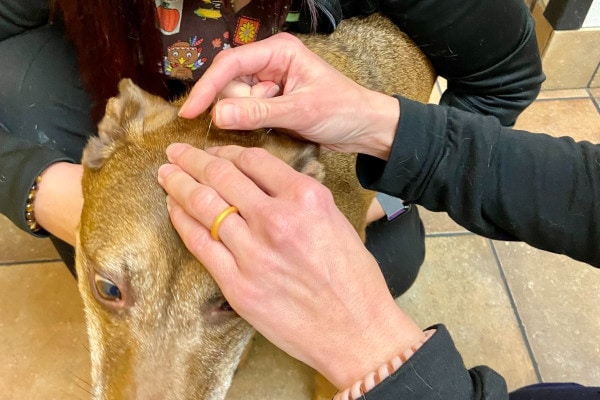
Acupuncture for dogs gives more good days
With its many benefits and virtually no drawbacks, acupuncture can be a great tool for many dogs. I really do believe it has the potential to improve quality of life and give dogs more good days. After all, I have seen it with my own eyes, both with my dog and in the lives of the countless dogs I have treated with acupuncture since then. If you are struggling to manage your senior dog’s pain and poor mobility, why not consider finding a veterinarian who does acupuncture for dogs near you? I think your dog will thank you.
How has your dog benefited from acupuncture?
Please share his or her story below.


I totally agreed. My almost 13-year old Sheltie, had improved significantly through a series of treatments including acupuncture. He almost lost his mobility about 6-7 months ago. Can’t even walk out of the house gate to go pee and poo outside. I almost wanted to get him a wheelchair but his usual vet said no. And advised me to seek rehab treatment. I am so glad I took her advise !
Hi Doris,
I am glad your Sheltie has seen such significant improvement with his rehabilitation program. Thank you for sharing your experience with our readers as there may be someone else in a similar situation. I hope your senior boy continues to thrive. Wishing you both many happy days ahead!